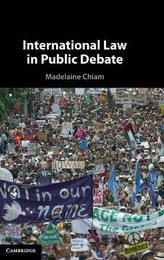
|
International Law in Public Debate
Hardback
Main Details
| Title |
International Law in Public Debate
|
| Authors and Contributors |
By (author) Madelaine Chiam
|
| Physical Properties |
| Format:Hardback | | Pages:240 | | Dimensions(mm): Height 235,Width 158 |
|
| ISBN/Barcode |
9781108499293
|
| Classifications | Dewey:341.0994 |
|---|
| Audience | | Professional & Vocational | |
|---|
| Illustrations |
Worked examples or Exercises
|
|
Publishing Details |
| Publisher |
Cambridge University Press
|
| Imprint |
Cambridge University Press
|
| Publication Date |
9 December 2021 |
| Publication Country |
United Kingdom
|
Description
Public debates in the language of international law have occurred across the 20th and 21st centuries and have produced a popular form of international law that matters for international practice. This book analyses the people who used international law and how they used it in debates over Australia's participation in the 2003 Iraq War, the Vietnam War and the First World War. It examines texts such as newspapers, parliamentary debates, public protests and other expressions of public opinion. It argues that these interventions produced a form of international law that shares a vocabulary and grammar with the expert forms of that language and distinct competences in order to be persuasive. This longer history also illustrates a move from the use of international legal language as part of collective justifications to the use of international law as an autonomous justification for state action.
Author Biography
Madelaine Chiam is a Senior Lecturer and Director of Teaching and Learning at La Trobe University Law School. She is also a founding member of the La Trobe International Legal Studies Research Group.
Reviews'Rigorous, insightful and an enthralling read - this book could not be more timely. In clear and engaging prose, Chiam highlights the richness and potency of vernacular versions of international law propagated at three fraught historical junctures of the 20th century. In so doing, Chiam cleverly re-wires 21st century worries about the challenges that populism and inequality pose to international law. Rather than imagining these as new and terrible trials for international legal order, this book reminds us that international law has long been popularly generated and generative under conditions of inequality. Even in war, Chiam demonstrates, international legal authority has been far more amenable to collectivization and cutting across prevailing friend-enemy lines than commonly acknowledged. And, Chiam shows, these skills might yet be relearned by international lawyers listening with care to non-native speakers of their discipline.' Fleur Johns, Faculty of Law and Justice, UNSW Sydney 'Madelaine Chiam's fascinating study comes at a time when, on the one hand, populists in many places charge international law with being an elitist agenda that does not speak for the people and, on the other, the involvement of legislatures in foreign policy is on the increase. Chiam provocatively rejects the perception common to both trends that only international lawyers 'speak' international law. She subtly shows how Australians debating war in the public sphere have been speaking the language since World War I. By tracing the diverse interventions of politicians, trade unionists and religious leaders in terms of 'popular international law,' Chiam productively resets a range of important conversations about international law, politics and popular sovereignty.' Karen Knop, Cecil A Wright Chair, University of Toronto Faculty of Law 'In these remarkable pages, the idea of 'public' international law comes bursting through with new and unexpected meaning as Madelaine Chiam expertly sets to work on charting its life beyond the usual sanctuaries of operation-such as diplomatic correspondence, international litigation and jurisprudence, governmental memoranda and domestic legislation. Here, it is a very public 'public international law' - otherwise called 'popular international law' - that emerges from the close and admirable dissections of public argumentation that accompanied the First World War, the Vietnam War and the Iraq War. It is a superbly rewarding study full of discernment and bracing insight.' Dino Kritsiotis, Co-Director of the Nottingham International Law and Security Centre (NILSC), University of Nottingham
|